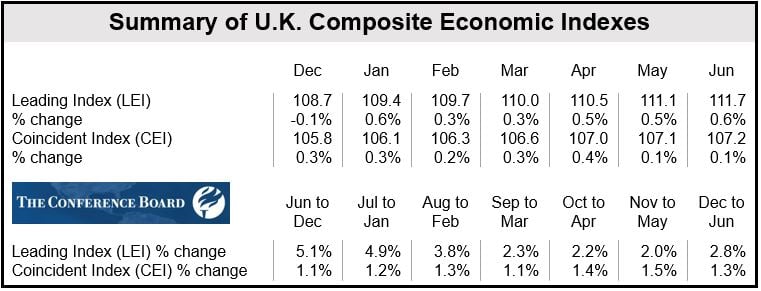UK economic indicators improved in June, says The Conference Board. The Leading Economic Index (LEI) rose 0.6% to 111.7 (2004=100), after increasing 0.5% in both April and May. Of the seven components that make up the LEI, six posted positive contributions.
Bert Colijn, Senior Economist at the Conference Board, said:
“The Leading Economic Index for the UK continues to improve, suggesting further economic growth in the coming months. June’s increase in order book volume and expected output suggest the UK economy is not likely to slow down amid concerns about tensions in Eastern Europe and deflation in the Euro Area.”
“This domestic strength should keep the British economy growing at a faster pace than its continental neighbors.”
The Leading Economic Index (LEI)
The UK’s LEI has been increasing since the summer of 2013, consequently, its six-month growth rate has been positive, albeit at a slower pace recently.
Below is a list of the seven components that make up the LEI and how they contributed to June’s result. They are listed in order with the largest contributor first, etc.:
- yield spread (positive),
- volume of expected output (positive),
- consumer confidence (positive),
- order book volume (positive),
- productivity for the whole economy (positive),
- total gross operating surplus of corporations (positive),
- stock prices (negative).
During the first six months of 2014, the LEI rose by 2.8%, with six of the components contributing positively.
(Data source: The Conference Board)
The Coincident Economic Index increased
The CEI (Coincident Economic Index), which measures current economy activity, rose by 0.1% in June, after increasing in April and May by 0.4% and 0.1% respectively. The CEI now stands at 107.2 (2004=100).
All four CEI components contributed positively to June’s figure. They are listed below in order (largest contributor first, etc.):
- employment (positive),
- industrial production (positive),
- real household disposable income (positive),
- retail sales (positive).
During the first half of 2014, the CEI increased by 1.3%, with all the four components contributing positively.
UK GDP exceeds pre-crisis peak level
The UK’s gross domestic product (GDP) has recovered completely from the global economic crisis of 2008/2009 and the Great Recession that followed.
UK GDP is now larger than it was in the Q1 2008 peak, according to data published by the Office for National Statistics in July.
The financial crisis and subsequent recession caused the British economy to shrink by 7.2%.
According to government statistics published on August 13, the unemployment rate in fell to its lowest level since 2008.

